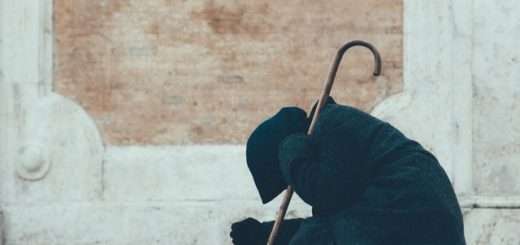The Power of Faith – By N. Akram
As the saying goes: The Lord has a mysterious way of doing things. He certainly does, as I was to realize after 40 years of my existence. An hour of so of TV viewing was destined to change my life forever. It was a pleasant April night not so long ago. After having witnessed the cold-blooded murder of Iraqi women and children by trigger-happy Americans, I called it a day and decided to hit the sack. Sandman, however, eluded me that night and I soon found myself slouching on the sofa with the TV remote in my hand. The news channels were taking a break. So, I decided to do a little bit of channel surfing and the sight of a wolf on the National Geographic Channel caught my attention.
It was in a wilderness somewhere where a she-wolf, holed up in a small cave, about to bring forth new life in this world. She was a first-time mother, and like all about-to-be mothers, she was a bit nervous as the hour approached for her to give birth. At first, as if in a daze, she was seen clawing the ground, apparently to make the ground softer for her expected brood. She could hardly stay still, and moved constantly, rubbing her body against the surface, as if testing the softness of the soil. A few minutes later, she gave birth to her first cub. She was visibly excited and almost buried her cub in the dirt. However, quickly realizing her folly, she realized that the newborn had to be fed. But the cubâ’s movements were restricted, owing to the still intact umbilical cord. To my amazement, the she-wolf examined the cord, and moments later removed the cord with surgical precision. The baby was free to move around now and both mother and baby struggled to connect. The mother eventually figured it out and slowly guided her baby to the right place. An hour later, she gave birth to her second cub; this time everything went well.
A few minutes later, a giraffe was shown coaxing her new-born calf to follow her to the rest of the herd. It seemed the calf did not have the strength to stand on its legs, and the more he tried, the weaker he got. In the end, he simply gave up. But the mother didnâ’t. She stood over him, guarding her calf from the approaching hyenas that had sensed what the mother, out of love for her cub, could not, the smell of death. The mother fought the hyenas all day and night. Both the mother and the now-hungry hyenas waited patiently, although for different reasons. By the next morning, it was imminent that the hyenas would have what they have been waiting for all night, but the mother was still hopeful. She nudged her newborn gently, hoping for a response. There was none. She nudged again, and then it dawned upon her. She had lost her baby. She gave it a last look and slowly moved away, making way for the hyenas to clean up.
What is the point of this narration? Is it about motherhood? Is it about compassion? Is it about each specieâ’s desire for continuation? To a certain extent, yes, that was my initial reaction as well. But then something got me thinking: the she-wolf never took Lemanâ’s Classes or had the privilege of being trained in post-natal work by an elder. As for the giraffe, well she could have easily moved on to join the herd and abandoned her child, after all animals are known to do that. Even humans have been reported to dump their unwanted children. So why not a giraffe? Forces of nature or the will of Allah?
Years of formal and informal education and training have conditioned me, and millions like me, to believe what we see, state what we can prove and apply logic when everything else fails. And when logic, reason and vision fail us, we blame it all on fate. Numerous hours were spent on me to convince me why sea and see, which sound similar, are spelled differently. But no one ever bothered to explain to me what to believe in case I cannot see, reason with or be able to prove?
I was made to believe the existence supernatural beings; an effective tool to keep us out of their way. Yet, no one has ever tried to train a young mind how to truly believe in the Almighty. We absolve ourselves by engaging a Qari sahib to teach our children the Holy Quran because most of us have now forgotten how to read the Holy Book. The Qari comes and goes, taking his Hadia at the end of the month, while we, the Muslim parents, stand absolved of our duty to teach our children the meaning of faith.
I remember umpteen years ago, I wanted to be an accountant. So, I took up Accounting 101, only to find out that I will have to take accounting courses for the next four years, in addition to appearing before a State Board to be certified as an accountant. And here I was, with an introduction to Faith 101, Kalima and its translation, and then left on my own to appear for the final exam. What a pity!
The majority of Muslim children growing up in Pakistan have rudimentary knowledge of their faith. They know the Kalima and what it means, a few Surahs they know by heart for an exam, and yes the basic reading skills of the Holy Quran that a child has learnt while he was too young to comprehend the meaning of what was being taught to him. Then there are tidbits that the children pick up from their parents, and a few pieces of advice here and there to keep them in check. Nowhere during the developmental stages of their lives are they taught the true meaning of the Kalima, which is the key component of a Muslimâ’s contract with his/her Creator. Yes, they are told to fold their hands in a certain way while they are praying. However, what is not taught to them is what it takes to be a Muslim.
No teacher, or parent for that matter, has ever taken the time to explain it to his or her ward what the Kalima stands for. Why is it that every Muslim is required to pray five times a day? Why do we need to fast, and what is its significance? For an ordinary Muslim child in Pakistan, these are all either exam questions or actions they are expected to emulate, whether they like it or not. And in time it all fades away, as a sound foundation was never laid for these young people to build their faith. In the end, these confused children-turned-adults crowd Friday and Eid prayer gatherings, following in the footsteps of their parents.
Religion, for most of the baby-boomers, my contemporaries, has become a weekend thing, where offering the Friday prayers means absolution from everything that is required of a Muslim. One only needs to drive around town on a Friday to find traffic jams on the streets housing the fashionable, mostly air-conditioned mosques, yet the same mosques witness fewer if any visitors during morning prayers.
An average Muslim adult in this country is liable to be accosted by a number of religious organizations during his lifetime. Some offer absolute salvation owing to the manâ’s unconditional submission to the organizationâ’s charter, others offer martyrdom in lieu of fighting for their cause, and some try to instil the fear of Allah in a manâ’s heart through fear of hell, and yet there are some who offer absolution from Allahâ’s wrath if a person is to join their ‘œchosen path.’
I am not qualified to judge their intentions nor to pass judgment, yet I am entitled to ask a question: What kind of efforts are they putting in to make their recruits better Muslim? Do they know what it means by ‘œThere is no god but Allah and Muhammad (Peace be upon him) is His messenger.’ Do they realize that it is the formal contract of a man with Allah that every man who recites this Kalima believes that everything in this world is subservient to the will of Allah, and that Mohammad is His messenger meaning thereby that the ways of Prophet Mohammad (Peace be upon him) are the most desired ways to be emulated.
So where do we start? By renewing our vows. We must first try to develop a clear understanding as to what is meant by: ‘œThere is no god but Allah and Muhammad (Peace be upon him) is His messenger. Years ago, my aunt used to tend to us when we were sick, and used to chant ‘œYa Shaafi, Ya Kaafi’ before dispensing medicine. I had always wondered why she said what she said. After all, before we went to see the doctor, we were told the particular doctor had shifa and we will get better. Thirty years later, I am just beginning to understand why she called upon her Creator for health, even though the best doctor in town has prescribed her the medicine.
Each one of us today has developed our own version of Islam. We have our own individual checks and balances that we have developed to soothe our troubled conscience. If we steal electricity, or taxes, or get our kith and kin employed out of merit, we resort to philanthropy, hoping that it will balance it all out. Isnâ’t that what business schools teach us? There was this policeman who accepted a bribe of Rs5,000 and came home with the booty. As his wife rushed down the stairs to greet her husband, she tripped and fell and broke her leg. The policeman took her to the hospital and the doctors fixed her up. He was handed a bill amounting to Rs5,000. He paid the bill and told his wife, ‘œYou see, if I had not taken the money, I could never have been able to pay for your treatment.’
Today, millions of people like myself are wondering what to do? We lack faith, are devoid of the basic understanding of our religion and are millions of miles away from being a Muslim. We pray every night and ask Allah for forgiveness, knowing well that in the morning we will seek the assistance of mortals to further our interests. We blame everyone else but ourselves for our miseries, but wonder why Allah does not heed to our requests for help. We feel that praying five times a day qualifies us to receive Allahâ’s nusrat. Little realizing that namaz is just one element of our faith. Being a Muslim means more than just offering prayers; it means emulating the life of Prophet Muhammad (Peace be upon him) and conforming to the dictates of the Holy Quran, not in part or what suits us, but in its totality. And unless we understand the meaning of the Kalima, we donâ’t stand a chance of redeeming ourselves in this world or the world hereafter.












